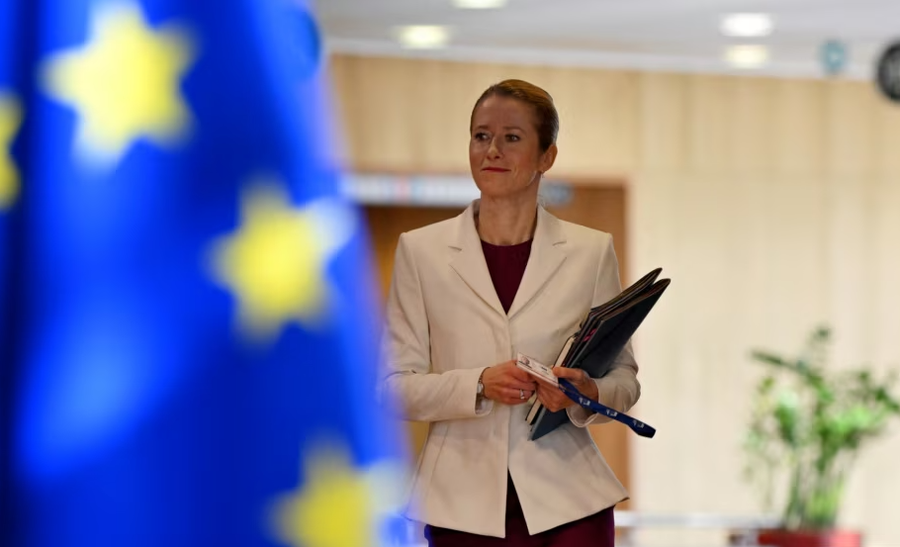
The European Union's foreign policy chief warned of exploring alternative means to dialogue, so that Kosovo and Serbia can take steps towards normalizing relations. How do experts in Pristina and Europe see the way forward?
"Maybe it's dialogue, maybe it's another tool. I'm ready to look into this issue, and I will do so together with the Special Representative [for dialogue, Peter Sorensen] in the coming days."
This was stated by the European Union High Representative for Foreign Affairs and Security Policy, Kaja Kallas, to Radio Free Europe (REL), as she said that the EU is interested in seeing progress towards the normalization of relations between Kosovo and Serbia.
But, for Donika Emin, from the Balkan Policy Advisory Group in Europe (BIEPAG), although this statement, as she puts it, may seem like "something pompous and innovative, unfortunately it is not."
She tells REL that, from the visit to Pristina of the EU envoy for the dialogue, and from the conversations she has had in Brussels, she has gained the impression that in the European bloc "the tendencies are for the dialogue to return to a technical level, because the EU still considers the 2011-2013 technical dialogue as the most important and most successful part" of the process.
Objective of the dialogue
However, according to Emini, the objective of EU mediation cannot be the normalization of relations between the two countries, without clarity on what it really means, how long the process will last, and how it will end.
Emini believes that the EU should conclude the dialogue process with an agreement that has clear content, and not call itself only a facilitator of the process and say that it sees other instruments besides dialogue to achieve normalization.
"Otherwise, we continue like this technically, people in the EU are paid to work with us, while we play the door in the region and postpone it for another five or ten years, until something bigger is done or there is intervention from actors outside the EU."
Toby Vogel, from the Berlin-based Council for Democratization Policy, claims that the ultimate goal, which he says is a legally binding agreement for comprehensive normalization, has been "forgotten" throughout the process, which began in 2011 - initially at a technical level, then at a political level.
He tells REL that from Kallas's statement he understood that the EU is nearing the end of its policy reassessment regarding the bloc-facilitated negotiation process, to understand "what has worked and what has not in the dialogue so far."
A new approach to the process
Vogel believes that the Kosovo-Serbia dialogue should be part of a broader EU strategy.
He considers that, initially, one must look at what has happened in the dialogue, as well as the approach that the EU has had, which, according to him, has been "biased in favor of Serbia."
Although the process has produced two major agreements – the Brussels Agreement in 2013, and the Ohrid Agreement in 2023 – Vogel says that Kosovo has not implemented the agreement on the Association of Serb-majority Municipalities, but Serbia, with the "tolerance" of the EU, has also not implemented any commitments and has campaigned against new recognitions and against Kosovo's membership in international organizations.
According to Vogel, the new EU foreign policy chief should not leave Serbia "unpunished" for not aligning its foreign policy with that of the bloc. He believes that the impasse in the dialogue has occurred because the EU has treated the process as separate from its foreign policy.
Emini also believes that Brussels needs to change its approach to the dialogue. According to her, “pressure on Kosovo” alone – which is under punitive measures from the EU – is not enough for the dialogue to succeed, as the problem, for her, lies with President Aleksandar Vučić in Serbia.
Officials in Kosovo have often complained about an unbalanced approach to the dialogue, when its facilitators were Josep Borrell and Miroslav Lajcak – figures from two states within the bloc that do not recognize Kosovo's independence.
For Vogel, it makes no sense for the dialogue to resume with the same approach during Kallas's mandate, nor if Serbia continues to say it will never recognize Kosovo.
He believes that the process should be reformatted and returned to its original objective: to be fully focused on reaching a final agreement, and not used for crisis management.
Due to the crises in northern Kosovo, which increased tensions between the two countries, no round of political dialogue has taken place in Brussels since September 2023, but there have only been talks at the level of chief negotiators./ REL (A2 Televizion)











